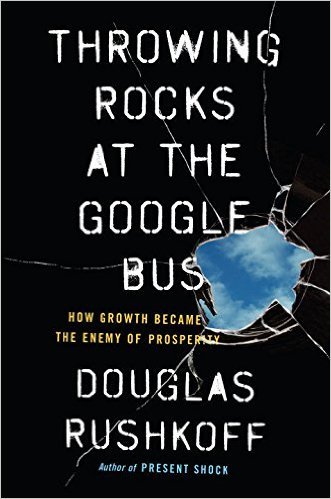Throwing Rocks at the Google Bus
The Economic Operating System
 I recently read Douglas Rushkoff’s provocative new book, Throwing Rocks at the Google Bus.
I recently read Douglas Rushkoff’s provocative new book, Throwing Rocks at the Google Bus.
Rushkoff is a media theorist, but this book falls comfortably into the area of big think economics. Its premise is that the underlying “operating system” of our economy — capital growth above all else — is not a fundamental law of markets, but was instead something selected four hundred years ago for some less than noble reasons.
(For a more grounded take on the same premise see Bill McKibben’s Deep Economy, which, if you’ll excuse a bit of trivia, was also a titular inspiration for my most recent book.)
Its Implications on Distraction
I’m not as interested as Rushkoff in making a moral judgment on the nuances of our market economy — a discussion above my pay grade.
What caught my attention with respect to our conversation here was the conclusion, implicit in his argument, that many of the features that have built the Internet into a weapon of mass distraction are not intrinsic to the medium, but are instead a side-effect of its cooption as a tool for capital growth.
That’s a heavy sentence. Let me attempt to unload it…
Rushkoff notes that after the biotech crash of the 1980’s, investors needed a new sector that could continue to fuel capital growth.
The Internet filled this role. Among other things, it exposed net users’ attention and personal data as an under-exploited resource that could be extracted and sold, and therefore support growth much in the way colonizing a country and extracting minerals from the ground once did.
As in any extractive industry, the more resources you can mine, the better. This led the way to attention engineering and the general/inevitable push to make applications and sites as addictive as possible.
This capital-driven push toward maximum addictiveness led to the shiny tangle of apps and infotainment sites that have become the bane of potential deep workers worldwide.
This is an important distinction.
When I take a stand against social media, in other words, I’m not taking a stand against the contents of your feed, but am instead taking a stand against these large companies’ insistence that the intrinsic value of my attention should flow into their coffers instead of being directed by me toward deep work on things I find important.
Rushkoff’s observations, however, do more than fuel righteousness. They also provide hope.
The Internet can and should be a source of peer-to-peer connection, serendipity, interestingness, and even revenue generation. But we shouldn’t necessarily expect the venture-backed corporations sprinting to generate 100x returns to be the best source of these rewards.
Cal Newport's Blog
- Cal Newport's profile
- 9946 followers



